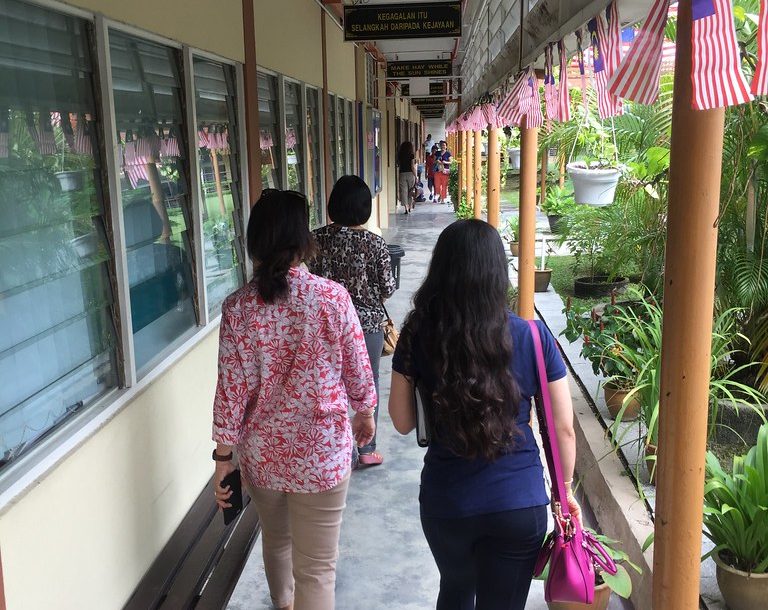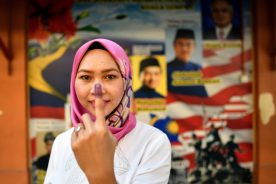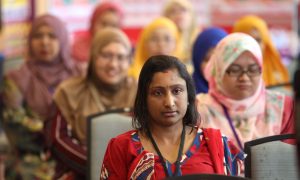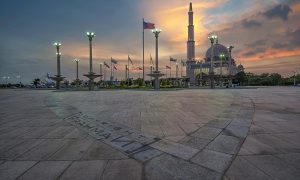In a series of public service announcements (PSAs) in March 2020, Malaysia’s Ministry of Women, Family, and Community Development (KPWKM) provided ‘tips’ on how women can avert domestic conflict during Malaysia’s COVID-19 lockdown: “If your husband does something that conflicts with what you would like him to do, avoid nagging him. Instead, use a humorous approach: say for example, ‘this is the way to hang the clothes, my darling’, (impersonate Doraemon’s voice and giggle playfully and affectionately).”
It is likely that the female empowerment agenda may critically regress under Prime Minister Muhyiddin Yassin’s new administration, and the push for reforms of gender equality may not be as robust as it was under the Pakatan Harapan (PH) coalition, ousted from government by Perikatan Nasional (PN) earlier this year. However, Malaysia’s civil society, the Opposition, and the urban professional class are alert and have vocally pushed back on any signs of official chauvinism under the current administration.
Political Representation and Agendas
PH had nine women in the Cabinet: five ministers and four deputy ministers. While this figure remains the same under the PN administration, the ratio of women to men in the Cabinet has reduced from 18 per cent to 13 per cent given that Muhyiddin’s Cabinet is larger. KPWKM that was previously helmed by then Deputy Prime Minister Wan Azizah and her deputy, Hannah Yeoh, is now led by Rina Harun, from Parti Pribumi Bersatu Malaysia (Bersatu), and her deputy minister, Siti Zailah, from PAS.
Both Rina and Siti have come under fire since taking office. The former received flak after a tweet from her Ministry that announced the Talian Kasih hotline would be suspended for two weeks from 18 – 31 March, due to the movement control order (MCO) in Malaysia. Talian Kasih, a hotline for complaints on domestic abuse and child protection, was set up by the previous government.
After pressure from Wan Azizah, Hannah Yeoh, several women’s rights groups, and female politicians including Azalina Othman, an UMNO Member of Parliament (MP) and former minister, the tweet was deleted and Rina declared the reinstatement of the hotline services.
However, Siti continues to prioritise her agenda of pushing for policies that would ensure the uniforms of Muslim flight attendants and athletes are Syariah-compliant. A cursory glance over the chronicle of her political history does not inspire confidence in progressive Malaysians. In 2013, Siti suggested a female dress code to prevent indecent dressing in public, contending that it would curb growing rates of sex crimes and sexual harassment. The following year, when Malaysians were still grieving on the MH17 tragedy, Siti stirred uproar stating that the government should ban serving alcohol in flights and pay attention to the dress code of female air stewardesses so that no one dies in sin, as “Allah’s wrath” is inevitable. In 2017, Siti endorsed child marriage as “the guidance of Allah” and described it as a “blessing”.
Siti’s positions are consistent with PAS’ ideology. In 2018, PAS’ state agencies in Kelantan arrived at a consensus that underage marriages are in keeping with Islamic laws and are a “necessity” in the state. They also rejected two United Nations conventions on women and children, stating that they were not apt for Muslims in Kelantan.
The change in government has left PH’s proposed reforms for women up in the air. Their ministry had introduced a national strategic plan in January 2020 to address child marriages and was looking at the amendment of the Islamic Family Law (Federal Territories) Act 1984 to raise the minimum age of marriage for Muslims to 18. They had also sought to table a Sexual Harassment Act and anti-stalking laws in the Parliament’s seating scheduled for March 2020, and were planning to enact an anti-gender discrimination law and a Gender Equality Act.
Siti has remarked that previous policies will be assessed, and if they are in accordance with the Quran and hadith, they will be accepted. When queried on the anti-child marriage national road map, she said that a single formula could not be used to solve the issue and the national strategic plan must be reviewed as child marriage has several factors, including poverty, social issues, and customs.
UMNO MP Azalina Othman has criticised Siti’s comments and urged her to not enable sexual predators to use marriage and justify exploitation through religion to negate or manipulate laws that protect children, especially the Sexual Offences Against Children Act 2017. This Act was passed by the Parliament when Azalina held the position of the then de facto law minister.
The women’s wing of the Malaysian Chinese Association (MCA), another component party of the PN government, has also raised its voice to check PAS’ Islamist agenda, supporting the protection of the rights and welfare of children and the outlawing child marriage. Heng Seai Kie, the chairperson of MCA’s women’s wing has consistently maintained an abrasive relationship with PAS, claiming that the implementation of hudud is unconstitutional. However, as MCA holds only one seat in Muhyiddin’s Cabinet, it’s political capital may not be sufficiently strong to push for policy reform. Arguably, PAS’ conservative influence may be somewhat mitigated by UMNO members of the coalition. While in government, UMNO sought to promote the socioeconomic position of women, including supporting their participation in tertiary education and the workforce. But UMNO is also under-represented in the Bersatu-dominated Cabinet and most of the male ministers may not share Azalina’s views or are altogether apathetic on women’s issues.
Setbacks for Female Empowerment?
Muhyiddin has reassured the nation that even though Siti has her personal views on specific issues, the government’s stance takes precedence. He also said that Rina will need some time to study her new portfolio, and that both of them should be given a chance.
As Muhyiddin is striving to win the confidence of Malaysian women, it is unlikely that PN would implement policies that would further undermine women’s current position in society. However, the apparent blind spots of ministers charged with protecting and advancing women’s interests remain a serious cause for concern. Furthermore, issues that may touch on religion, such as child marriage, will be challenging to address regardless of which coalition is in power.
Securing the electoral success of women in Malaysia Baharu
Despite female politicians’ ambivalence about gender quotas, they remain an essential tool in making politics more representative.
When Senior Minister Fadillah Yusof stipulated that only the “head of the family” was allowed to step out of the house during the MCO to purchase daily essentials or medicines, women reported on social media that they had, in fact, been stopped by the police and questioned if they were head of the household. These incidents underscore that chauvinist attitudes or a certain inattention to the need to promote gender equality among segments of the government and society remain, alongside a wary public that will repudiate such proclivities.
The women’s ministry issued an apology for its COVID-19 PSAs and removed its posters after eliciting public derision for perpetuating gender inequality and promoting sexist norms. Soon after, Siti uploaded a video advising married women on how to deal with domestic stress. But yet again, she was slammed by women groups who said that the video “presented an underlying tone that women should accept, remain patient and forgive their partners’ abusive attitudes” and “the ministry failed to understand the issues and dynamics of being in an abusive relationship”. The MCA Youth Chief, Nicole Wong, also chimed in, stating that Siti was not fit to be the deputy minister, but later had apologised and retracted her statement, adding that it did not reflect the party’s position. However, women’s rights groups and Opposition politicians have openly expressed their concerns on the leadership of KPWKM in Malaysia’s new government.
Malaysia has scored poorly on female political empowerment and economic participation, and ranked 104 out of 153 countries in the 2020 World Economic Forum’s Global Gender Gap Index. Indeed, entrenched sexism in ministries and bureaucratic agencies is only the tip of the iceberg. There are darker dimensions to the perpetuation of patriarchal power in families: since the MCO, reports indicate that Talian Kasih has received around 1893 calls from distressed women, a 57 per cent increase from the usual number. This behoves the government and society at large to be vigilant.
 Facebook
Facebook  Twitter
Twitter  Soundcloud
Soundcloud  Youtube
Youtube  Rss
Rss 



